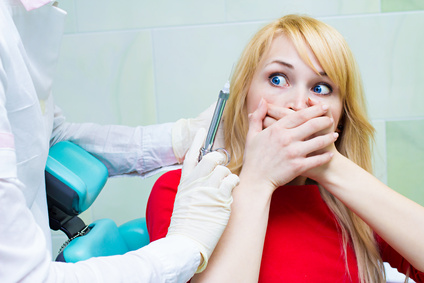Overcoming Dental Anxiety and Phobia
For one reason or another, fear of going to the dentist is extremely common around the world. Almost anyone can be affected by dental anxiety and it is characterized by a general unease about visiting a dentist. A more serious condition is dental phobia, a condition that causes intense, unreasonably fear of visiting a dentist. A person with dental phobia will do everything possible to avoid going and only visit when forced by extreme pain. It is important to treat both dental anxiety and phobia as these conditions can contribute to the neglect of teeth, which can in turn threaten both oral and overall health.
The difference between experiencing dental anxiety and phobia is not a fine science. Most people can live with mild anxiety about dental exams and visiting the dentist. Dental phobia is an intense, unreasonable fear or dread that can prevent people from receiving professional dental care for years, even decades. Feeling tense before an appointment is relatively common, but physical terror or sickness while waiting are signs of a more serious condition. People with phobia may cry at the thought of a dental exam, find it difficult to breathe during the appointment and/or have difficulty sleeping the night before.
There is not one clear reason why people experience dental phobia and anxiety. Fear of pain is a major contribution for many people, caused by a previous dental experience that was particularly unpleasant. Older people who experienced painful procedures as children often report this reason. Dental technology has improved greatly in recent years, and now many treatments are much less painful or completely pain-free. Loss of control is another common theme of dental anxiety; it can be difficult to see or understand what is going on at the dentist and this leads some people to feel helpless. The closeness of a dentist or hygienist can also contribute to unease and discomfort. Fear of needles and anesthesia is common in hospitals and this can overlap at the dentist surgery too.
Regular dental appointments are an important part of maintaining good oral, and overall, health. Dental phobia is therefore a risk factor for gum disease and early tooth loss. Poor oral health has been linked to conditions such as heart disease, which can be life threatening. On the cosmetic side of things, discolored or damaged teeth can severely affect a person’s self esteem and confidence. Visiting the dentist can improve the condition and appearance of teeth.
The first step to overcoming dental anxiety and phobia is to acknowledge the problem and talk about your fears. If a dentist is aware of your terror surrounding dental examinations, he or she will be able to work with you to make appointment easier and more comfortable. Patients with extreme phobia may need to be referred to a mental health practitioner. If lack of control is a major contributor to your fear, you could ask your dentist to explain everything they are doing during the exam or treatment and stop when you make a signal such as raising your hand.
Many modern dental surgeries use a range of distraction techniques (television, music, artwork) to ease their patients, while others specialize in using technology to lessen pain. It may be necessary to change dentists until you find one to suit your needs. If you have not had a dental exam recently, you may be surprised at how much equipment and technology has changed for the better. There have been many recent innovations with the purpose of reducing dental anxiety, such as the computer-controlled anesthetic delivery device known as ‘the Wand.’
A good tip is to visit the dental practice before your first appointment so you know what to expect on the day. Booking an appointment in the morning helps reduce time dwelling and thinking about the exam. Remember that your first appointment is likely to be limited to a dental check-up, with no needles or serious procedures. Consider bringing a friend or family member if you feel company may help you feel more comfortable.
Like other mental disorders, dental phobia can be treated. Sharing your fears and anxiety with your dentist and the dental practice staff will help them treat you in a more successful way. Clarification and understanding of procedures can help with anxiety. If you haven’t visited the dentist in a long time, you may be pleasantly surprised how much has changed. Dental exams are important to maintain good oral health; it is critical not to let dental anxiety risk your overall well-being.
More information visit Art & Science Dental
Tags: Art & Science Dental, Dental Exam, Overcoming Dental Anxiety and Phobia, professional dental care
